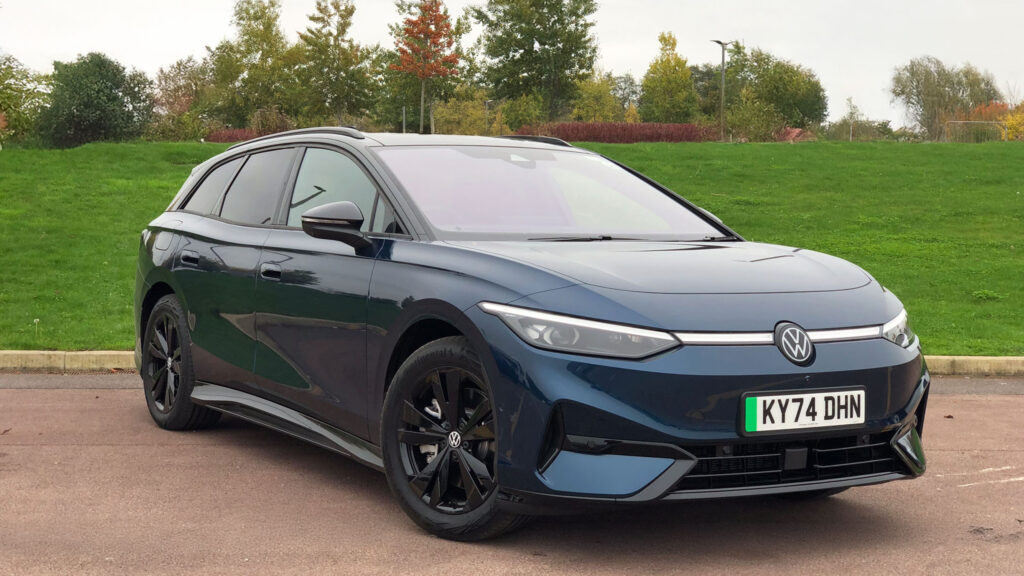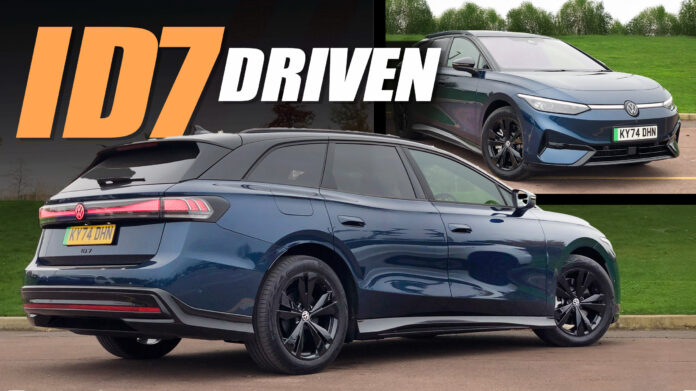PROS ›› Comfort refinement, long WLTP range, roomy, looks less boring than sedan CONS ›› Other EVs look more exciting, many are more fun to drive, fiddly minor controls
VW’s ID electric portfolio started with just one car, the ID.3 launched back in 2020. Four years later, there’s an entire family of ID models ranging from crossovers and retro minivans to this, the ID.7, all based on the same MEB platform.
The ID.7 is on sale in Europe now, but it’s still missing from showrooms in Australia, and earlier this year VW North America postponed the model’s US launch with no new date given for its arrival. The sedan was scheduled to go on sale before the end of 2024 for the 2025 model year, but worries about the cooling EV market forced a rethink.
We grabbed the keys to the new wagon variant to see whether those who can buy the ID.7 should, and those that can’t ought to be pestering VW to make it available.
QUICK FACTS
Overview and what’s new
The ID.7 is VW’s answer to the Kia EV6 and Tesla Model 3, but unlike those EVs, it offers the choice of both sedan (technically a hatch) and wagon-bodied Tourer shapes. The two variants ride on the same 116.8-inch (2,966 mm) wheelbase which is huge for the class – 2.6 inches (66 mm) longer than the Kia’s and 3.6 inches (91 mm) bigger than the Tesla’s.
But the Tourer’s longer roofline and more upright rear window gives it more cargo space than the sedan and arguably a touch more style. Neither version is going to make you swoon, mind. They’re like ID.4 and ID.5 SUV and crossover given a 1950s custom roof chop and sectioned body job to bring them lower to the ground. Not ugly, just lacking in the pizazz of cars like the EV6, as if VW wimped out halfway through the design process.
In the UK, the ID.7 comes in three trims: £52,240 Match, £56,140 Match Pro S Match and £62,670 GTX. The first two are the almost identical except for their battery sizes, but the GTX sets itself apart with an extra motor and all-wheel drive.
Review: VW ID.Buzz Is The Coolest Minivan On The Block, But There’s A Catch
What’s under the hood?
We drove the mid-spec ID.7 Match Pro S that gets the same 282 hp (286 PS), 402 lb-ft (545 Nm) motor on the rear axle as the entry-level car, but swaps out the 77 kWh battery for an 86 kWh unit. Many buyers might not see the need for the upgrade because the base car is fractionally quicker (6.6 seconds to 62 mph / 100 km/h versus 6.7 seconds) and is rated at 373 miles ( 600 km) of electric range.
But if you are planning on regularly taking some long trips, the bigger battery in the Pro S bumps the range to 424 miles (682 km). VW’s early ID models made do with a fairly slow 125 kW max charge rate, and even the base ID.7 is limited to 175 kW, but the ID.7 Pro S can handle 200 kW fills, which means a 10-80 percent top-up takes 26 minutes. A Kia EV6 will do the same almost 10 minutes quicker, but then the ID.7 can go much further between charges, meaning you don’t need to add as much energy to cover the same distance.
Whichever ID.7 you go for you have to pay extra (£1,050 in the UK) for a heat pump, though the range is so good you might decide its not worth the expense, especially if you live in an area with mild weather. If you live in a cold region, we wouldn’t be surprised if you got an extra 30 miles (50 km) of range with the pump fitted.
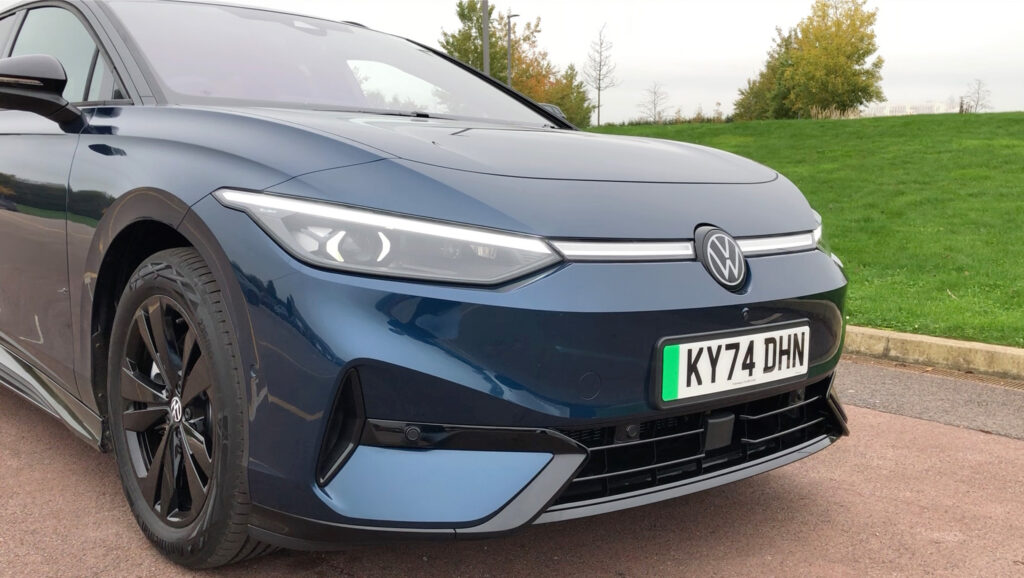
How does it drive?
We often think of EVs as cars for short trips, but the ID.7 would make a fantastic road-trip EV. Yes, it’s got a long range, but just as importantly it’s got the refinement and comfort to make you want to put that 424-mile range claim to the test.
For a start, it’s incredibly quiet. Wind noise is lower than in BMW’s much more expensive i5, tire road is subdued and the rear-mounted motor keeps schtum even when pressed. And then there’s the way it rides. The ID.7 smooths away all but the worst lumps and bumps, preventing imperfections in the road surface from getting through to your butt, your ears or your hands.
Admittedly, our press car came with DCC adaptive dampers and acoustic glass (bundled into a £2,100 Exterior Pack along with variable ratio steering and illuminated VW roundel), so we can’t say how good a base car feels, but certainly with the trick shocks and glass the ID.7’s a great cruiser.
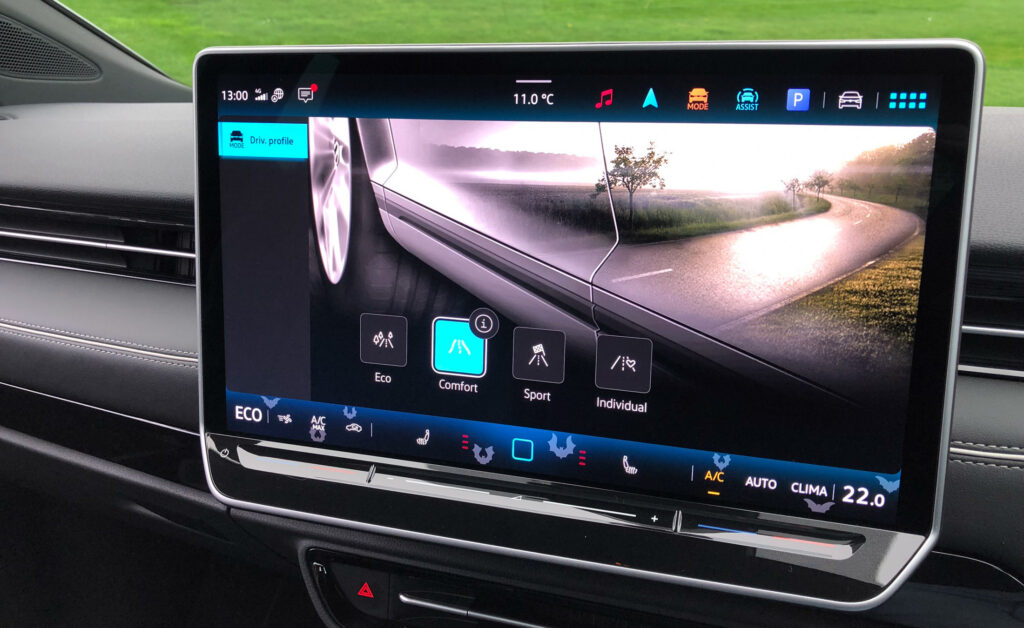
And that’s arguably what matters for a car like this. But if what matters to you is having fun when the traffic ahead disappears, other EVs do it better. The ID.7 is competent, but never entertaining, its steering too remote and its weirdly long brake pedal action lacking the initial bite you want when hustling a car. You also only get two different levels of regenerative braking to choose from and no one-pedal function, though there are four driving modes.
Related: New VW ID.7 GTX Tourer Adds Zing To Electric Wagon With 335 HP
The single 282 hp motor can get you to 62 mph (100 km/h) in under 7 seconds, which isn’t exactly slow, but the 320 hp (324 PS) Kia EV6 you can buy for the same money only needs 5.3 seconds. If you want that kind of go out of the ID.7 you’ll have to upgrade to the 335 hp (340 PS) bi-motor GTX that gets you to 62 mph in 5.5 seconds.
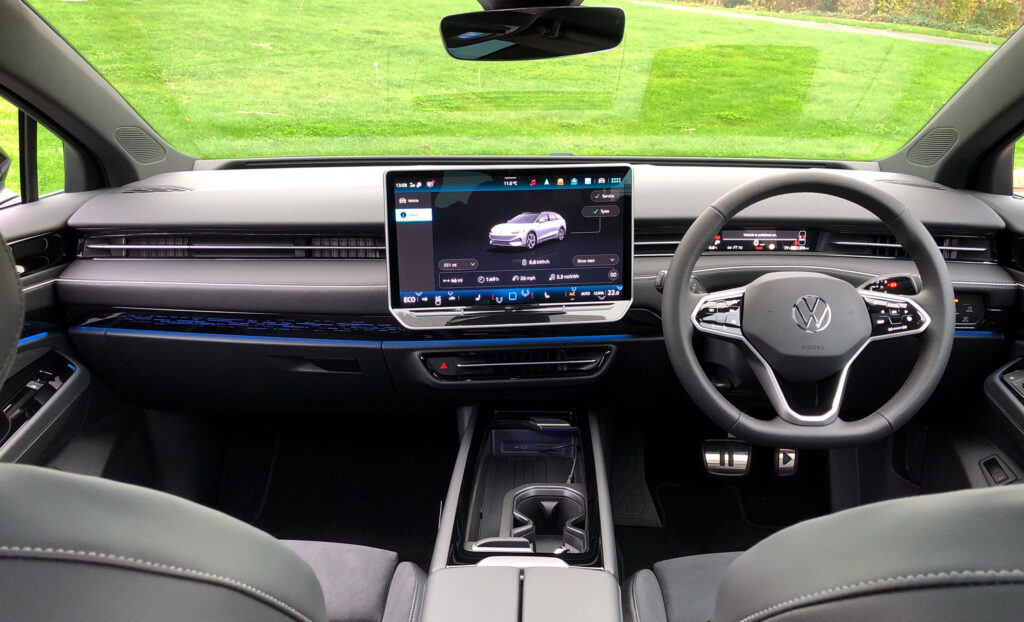
How’s the interior?
VW took some heat for the original ID.3’s cheap-feeling interior. Was this really the same company that gave us the game-changing MKIV Golf with its damped grab handles? But there are no quality disappointments with the materials in the ID.7’s cabin. Or comfort complaints. The front seats aren’t much to look at but they feel great and that’s before you’ve switched on the standard massage function.
You also get a much better touchscreen than was fitted to earlier ID cars. At 15 inches its bigger so is easier to see and use, and the heater sliders are now illuminated, but we’d prefer if both they and the volume control were old-fashioned rotary dials. Even the direction of the airflow has to be controlled electronically. The ID.7 is also stuck with nasty capacitive steering wheel buttons, whereas the Mk8.5 Golf (but not the R, strangely) have reverted to traditional buttons.
Photos Chris Chilton/Carscoops
What about space?
We’ve already mentioned the ID.7’s unusually long wheelbase, so it won’t come as much of a surprise to learn that this VW feels enormous inside with ample space for four adults. Sure, an SUV will provide more headroom, but the ID.7 never feels lacking in that respect and it has the kind of rear legroom that only an NBA star could find fault with.
And that rear legroom doesn’t come at the expense of cargo space. The ID.7 sedan offers 532 liters (18.8 cu-ft) of space that’s accessible via a sloping hatchback tail and is more than you get in rivals like the Tesla Model 3 (a true sedan). The Tourer’s wagon body boosts that to 605 liters (21.4 cu-ft), or a gigantic 1,948 liters (68.8 cu-ft) when the non-sliding rear seats are folded down.
That compares favorably with the 543-1,575 liters (19-56 cu-ft) offered by VW’s own ID.4 SUV and the 570-1,700 (20-60) void in the back of BMW’s pricier i5 Touring. See what we mean? The ID.7 Tourer really is road-trip-ready. The only negative is that there’s no frunk for storing charging cables – even on this model, which has no electric motor up front.
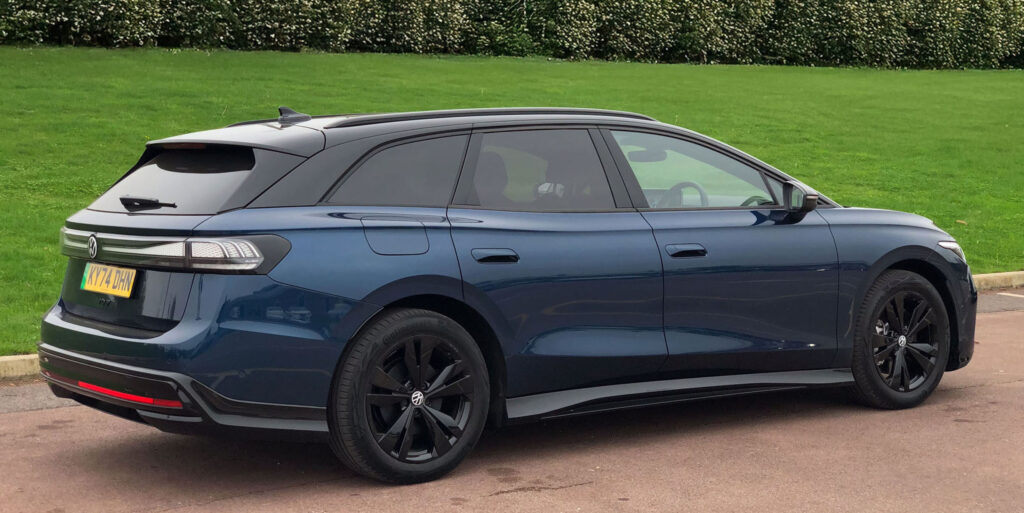
Verdict
The ID.7 isn’t knockout exciting to look at or to drive. But it is a great EV, and driving it six months after getting behind the wheel of the sedan makes me think the ID.7 deserves a bit more attention than it’s been getting. It’s comfortable, refined, roomy, and in Tourer guise has a spacious cargo area. If you’re not bothered about record-breaking 0-60 times and hot hatch-style handling, and can live with the still slightly annoying touchscreen interface, the ID.7 has a ton going for it.
We happen to think the Tourer wagon looks better than the sedan, too. So it’s a shame that if the ID.7 does finally make it to the US it’ll probably only be in fastback guise. But if you’re in the UK or Europe, do yourself a favor and take a look at what the ID.7 had to offer before you spend £15k more on a BMW i5 Touring.
